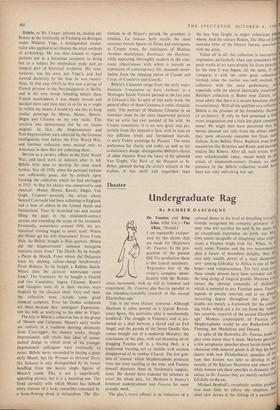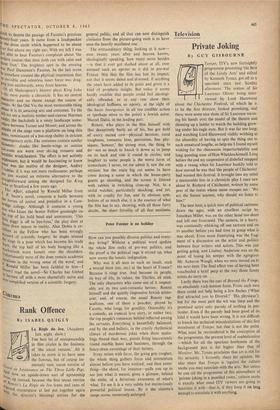Theatre
Undergraduate Rag
By BAMBER
GASCOIGNE
This is the most blatant nonsense. Although Marlowe is often quoted as a typical Renais- sance figure, this particular play is unashamedly medkeval. The struggle in Faustus's soul is pre- sented as a duel between a Good and an Evil Angel, and the parade of the Seven Deadly Sins comes straight out of a mediaeval Morality; the conclusion of the play, with tail-thrashing devils dragging Faustus off to a blazing Hell, is a traditional warning not to meddle with matters disapproved of by mother Church. The few gob- bets of 'science' which Mephistopheles produces were not even startling at the time, and Faustus himself dismisses them as 'freshmen's supposi- tions.' He should have widened his stricture to cover the whole' play, for Marlowe is history's foremost undergraduate and Faustus his most juvenile work.
The play's worst offence is its reduction of a colossal theme to the level of drivelling trivial'') Goethe recognised the romantic grandeur 0f . man who will sacrifice his soul in his quest 1° an exceptional experience on earth, but Mal lowe seems incapable of imagining what expert ences a Faustus might look for. When, in al early scene, Faustus and the two necromancer plan a future of boundless delights, they d° cuss only wealth, power of a most elemental. sort—joining Gibraltar to Africa is one of the' hopes—and voluptuousness. Yet very soon eV° these simple dreams have been crowded out b the long string of magical pranks. Marlowe cy`:1 misses the obvious crescendo of disilluslol which is essential to any Faustian quest. Faust!' repents at precise intervals and to an alms" unvarying degree throughout the play; Ili doubts are merely a framework for his conjal ing tricks, which are a far cry from the 'relellt less scientific research of the second Elizabeth'' age.' Modern counterparts of Faustus aft Mephistopheles would be not Rutherford an' Fleming, but Maskelyne and Devant. In spite of the fireworks, Dr. Faustus tends ti play even worse than it reads. Marlowe provide a few sumptuous speeches about lavish living (a obsession with material goods is all that his hey shares with new Elizabethans), speeches of the type that Jonson was later to develop in 5 mouths of Sir Epicure Mammon and others. 131c while Jonson sets these speeches in dramatic sift' ations, in Dr. Faustus they are merely recited arld fall dully on the ear. Michael Benthall's completely routine prodoc, tion does little to relieve the situation. HI chief new device is the ticking of a monstroa 5 Clock to denote the passage of Faustus's precious eenty-four years. It came from a loudspeaker ih the dress circle which happened to be about four feet above my right ear. With my left I was hst able to hear Faustus's complaint about 'the restless course/that time doth run with calm and silent foot.' The brightest spot in the evening was Paul Daneman's Faustus. In the last scene L somehow created the physical impression that an invisible and relentless inner force was drag- him earthwards, away from heaven. Of all Shakespeare's history plays King John 4 the most purely a chronicle. It has no central character and no theme except the course of "eats. At the Old Vic the most memorable thing hi bout it is its amazing sets and costumes. To the we see a realistic timber-and-canvas Norman castle; the backcloth is a misty landscape some- Where between Turner and Monet; and across the middle of the stage runs a platform on long thin Peles, reminiscent of a bus-stop shelter in strictest Contemporary style. The costumes contain similar elements: cloaks like beetle-wings or outsize tail-coats are worn over ski-ing trousers and heraldic windcheaters. The effect is not actively hrIPleasant, but it would be fascinating to know shat was the motive of the designer, Audrey ,., `ruddas, if it was not mere restlessness; perhaps she just wanted an extreme alternative to the ;traightforward setting she designed for King 'hit at Stratford a few years ago. jhe Afiair, adapted by Ronald Millar from II. Snow's novel, concerns a battle between the forces of justice and prejudice in a Cam- bridge college. Although it contains a young th" who kisses the Senior Fellow goodnight on loP of his bald head and announces, 'This Piggy is off to bye-byes,' the play does at 'riles draw nearer to reality. Alan Dobie is ex- cellent as the Fellow who has been wrongly teeused of scientific forgery; he slopes around he stage in a pose which has become his trade 11)4 rk, the top half of his body hanging like a mackintosh worn loosely u over the shoulders. hfoetunately most of the dons remain academic i`freations in the wrong sense of the word; and hRonald Millar has been faithful to him—I aven't read the novel—Sir Charles has fobbed o laymen off with a most shamefully naïve and Ter-simplified version of a scientific forgery.















































 Previous page
Previous page